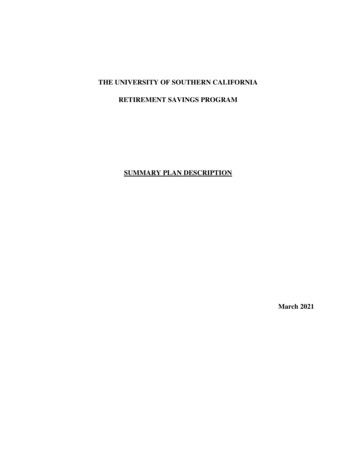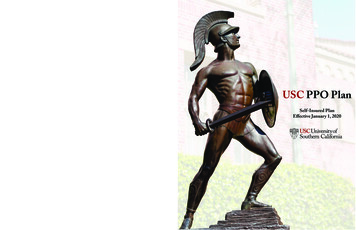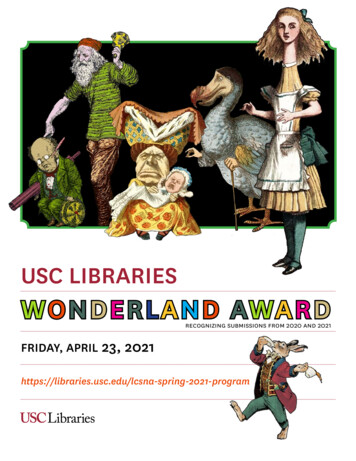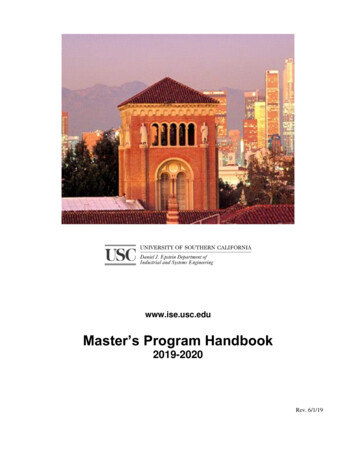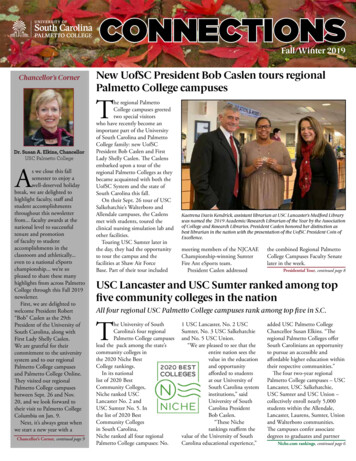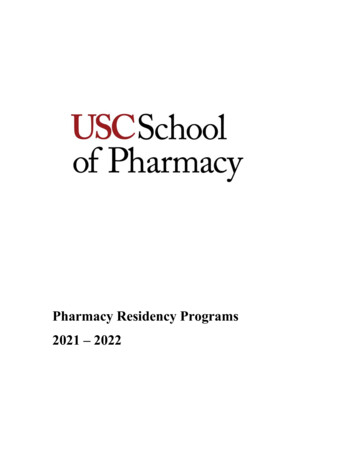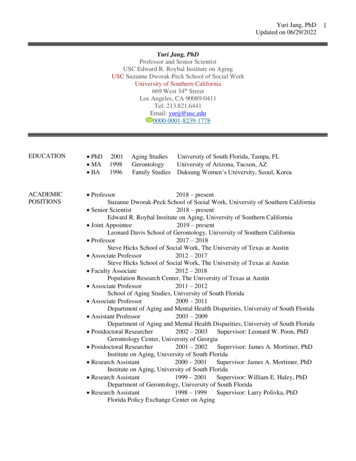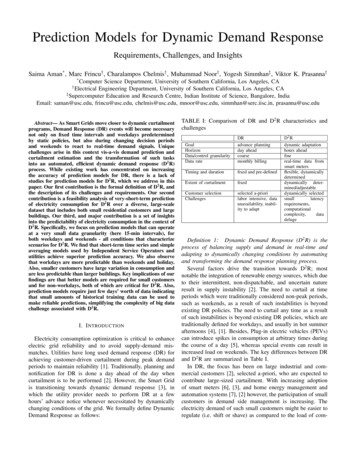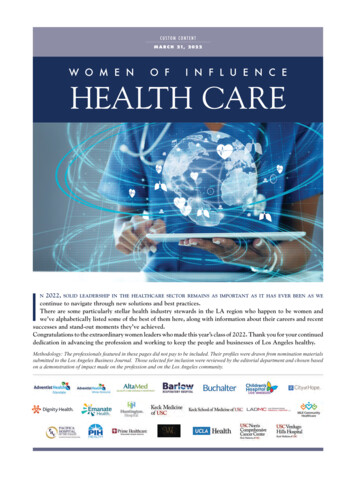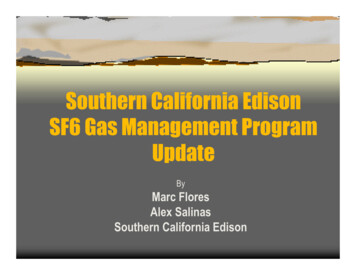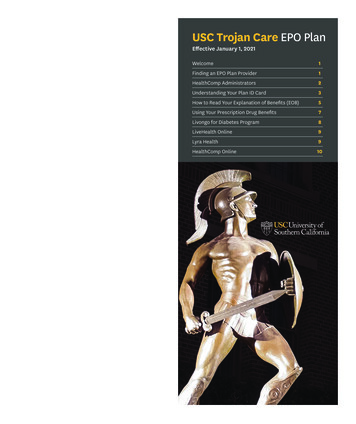
Transcription
University of Southern CaliforniaTHORNTON SCHOOL OF MUSICDepartment of Choral and Sacred MusicA Handbook for Graduate Students in Choral & Sacred Music2020-2021Thornton School of MusicUniversity of Southern California840 West 34th StreetLos Angeles, CA 90089-0851213.821.5756uschoral@usc.edu
CONTENTSFaculty and Staff. 3Introduction. 4Resources for Research and Study . 5Music Graduate Entrance Exam (MGEE). 7CHORAL MUSICMM Entrance and Admissions Process. 8MM Course Work . 9MM Recital. 11MM Comprehensive Examination . 14DMA Entrance and Admissions Process. 15DMA Examinations . 16DMA Graduate Committee Interview . 17DMA Course Requirements and Information . 18DMA Doctoral Dissertation. 19DMA Course Work. 20DMA Recital. 22DMA Timeline. 25DMA Dissertation Submission and Deadlines . 27SACRED MUSICMM Entrance and Admissions Process. 29MM Course Work . 30MM Project or Recital . 32MM Comprehensive Examination . 35DMA Entrance and Admissions Process. 36DMA Examinations . 37DMA Graduate Committee Interview . 38DMA Course Requirements and Information . 39DMA Doctoral Dissertation or Final Project . 40DMA Course Work. 42DMA Lecture/Recital. 44DMA Timeline. 47DMA Dissertation Submission and Deadlines . 49General Information for Graduate Students in Choral and Sacred Music . 51Ensemble Singing . 53Financial Issues, Departmental Projects and Festivals . 54DMA/MM Recital Preparation – Syllabus for MUCM 590 (MM) and MUCD 653 (DMA) . 55Requirements for Academic Minors/Elective Field in Choral or Sacred Music . 58HANDBOOK FOR GRADUATE STUDENTSPAGE2AUGUST, 2020
CHORAL AND SACRED MUSIC DEPARTMENT FACULTY AND STAFFDr. Jo-Michael Scheibe, Professor of Choral MusicOffice: MUS 203 213.740.3226 Jscheibe@usc.eduCourses: Chamber Singers, Choral Development, Choral Conducting II, Individual Conducting Lessons, Recital andDissertation SupervisionDr. Nick Strimple, Professor of Choral and Sacred MusicOffice: MUS 418 213.740.3227 strimple@usc.eduCourses: Choral Literature I, II, Music and the Holocaust, Holocaust and the Creative Impulse, Introduction to JewishMusic, Music of the Great Liturgies, Recital Supervision, Individual Composition LessonsDr. Cristian Grases, Associate Professor of Choral Music - Department ChairOffice: MUS 417 213.740.3225 grases@usc.eduCourses: Concert Choir, Choral Literature III, Introduction to Choral Music, Recital and Dissertation SupervisionDr. Tram Sparks, Associate Professor of Choral and Sacred Music310.614.1580 tram.sparks@usc.eduCourses: Choral Conducting II, III & IV; Cantata and Oratorio, Hymnology, Dissertation Supervision, Sacred MusicAdministrationDr. Ladd Thomas, Chair and Professor of Organ Studies213.740.7703 laddthom@usc.eduCourses: The Organist in Worship and Congregational Life, Private Organ InstructionProf. Mary Scheibe, Adjunct Professor562.852.8526 mscheibe@usc.eduCourses: Private Choral Voice LessonsProf. Lisa Sylvester, Associate Professor of Practice – Vocal Arts ChairOffice: RHM 206 213.740.7704 sylveste@usc.eduCourses: IPA for SingersProf. Lynn Helding, Professor of Practice – Vocal ArtsOffice: RHM 302 213.740.7704 helding@usc.eduCourses: Vocology, Vocal Pedagogy Teaching PracticumWoody Gatewood, Department CoordinatorOffice: MUS 416 213-821-5756 woody.gatewood@usc.eduHANDBOOK FOR GRADUATE STUDENTSPAGE3AUGUST, 2020
UNIVERSITY OF SOUTHERN CALIFORNIAIntroductionThe Choral and Sacred Music program in the Thornton School of Music at the University of Southern California iscommitted to excellence in Choral and Sacred music and to the importance of the Arts as an essential component of life.The curricula are designed to build a skilled and well-rounded musician and to develop the inherent musical, scholarly,and personal strengths of both the undergraduate and the graduate student. The program is committed to providingquality musical performance opportunities to both music and non-music majors, as well as to members of the University,Los Angeles, and the global community. The choral program accepts students who will pursue a variety of professionaldirections, including performance, education, research, and sacred music. Graduate courses are organized into the fields ofliterature and score study, the choral/vocal instrument, and conducting and teaching. The Sacred Music program alsoemphasizes administration and, when applicable, instrumental performance.Graduate students in choral and sacred music interact with undergraduates in this program, helping to build themusical and personal strengths of each. Choral ensembles are open to both music and non-music majors. Podium time isprovided through opportunities with the USC Thornton Choral Ensembles and the Repertory Singers. Many of ourstudents also hold conducting positions in local community choruses, colleges, and in churches and synagogues.Thornton’s location near downtown Los Angeles, in the city’s arts and educational corridor, affords its studentsimmediate proximity to the Performing Arts Center of Los Angeles County and an array of museums, research centers,libraries, the film and music industries, and thriving early and new music concert series.The USC Thornton Department of Choral and Sacred Music is actively involved with the work of the American ChoralDirectors Association, Chorus America, National Collegiate Choral Organization, Cantors Assembly, and the InternationalFederation for Choral Music. We believe the human spirit is elevated to a broader understanding of itself through studyand performance of Art, and that music ennobles the human spirit.HANDBOOK FOR GRADUATE STUDENTSPAGE4AUGUST, 2020
RESOURCES FOR RESEARCH AND STUDYLibrariesMusic LibraryThe USC Thornton Music Library, housed on the ground floor of Doheny Memorial Library, serves the needs ofscholars, performers, and music-lovers. The collections include approximately 20,000 books, 60,000 scores (both referenceand circulating), and some 25,000 recordings (CD, LP, cassette, video, and laserdisc). The Library owns or subscribes tomost major critical editions and scholarly journals on music and collects many more popular resources as well. A majoremphasis in recent years (in line with an ongoing University Library initiative) has been electronic resources, which includenumerous databases (e.g., FirstSearch, LexisNexis), reference works (e.g., Oxford Music Online), and electronic journalsincluding those available through JSTOR. There are listening and viewing stations, computer terminals, and reading andwork areas for the convenience of students and other patrons.Special archives within the Music Library include the Bickford Collection of guitar music, and the papers of composerIngolf Dahl. libraries.usc.edu/locations/music-library 213.740.0183 Andrew Justice, Music Librarian ajustice@usc.edu, 213.740.2926Doheny Memorial Library (DML)One of the most architecturally impressive buildings on the USC campus, Doheny Memorial Library, which opened tothe public in 1932, contains molded and polychromed ceilings, stained glass windows, and other decorative details thatwere carefully restored to their original brilliance. DML houses the University’s main collections of books and journals(with the exception of certain branch libraries); its other divisions include the Reference Center, Integrated DocumentDelivery (which combines the older current periodicals, interlibrary loan, and microform departments), Archival ResearchCenter (ARC), Cinema/TV Library (with significant music holdings, including the Alfred Newman Collection), and SpecialCollections Library. In addition, there is a display room for special exhibits. y tel. 213.740.6050 (information), 213.740.2924 (circulation), 213.740.4039 (Reference), 213.740.3994 (Cinema),213.740.3571 (IDD)Special Collections/Lion Feuchtwanger Memorial LibraryThe holdings of USC’s Special Collections Library, combining donations and materials actively collected by theUniversity, include some 130,000 books, 1.4 million manuscripts, and 1.3 million photographs. An important component ofthis division is the Lion Feuchtwanger Memorial Library, acquired from the estate of this émigré German writer (1884 –1958); this collection is particularly rich in materials from the German expressionist movement, but it also includes manysignificant items from the 18th and 19th centuries. Among other émigré materials is the Max Reinhardt Collection, in whichtheater and opera are well represented.Special Collections include a number of historic musical items dating as far back as the 15th century, as well asmanuscripts of important film composers such as Dimitri Tiomkin, and the autograph manuscript of Igor Stravinsky’sopera The Rake’s Progress. libraries.usc.edu/locations/special-collections tel.: 213.740.4035 (Special Collections), 213.740.5946 (Special Collections Librarian John Ahouse), 213.740.7119(Feuchtwanger Librarian Marje Schuetze-Coburn)HANDBOOK FOR GRADUATE STUDENTSPAGE5AUGUST, 2020
Leavey LibraryThe core of the Thomas and Dorothy Leavey Library, which opened in 1994, is the former College Library, to whichnumerous electronic and technological resources have been added. Leavey Library’s many networked computer stations,study rooms, and its long open hours make it a favorite place for students to study, individually and in groups.The Center for Scholarly Technology (CST) in Leavey Library assists faculty and other members of the USCcommunity with teaching and research-related projects, and it offers a year-round schedule of classes and other programson information technology. The Shoah Foundation is also located in the Leavey Library. libraries.usc.edu/locations/leavey-library tel.: 213.740.4350 (Leavey circulation), 213.740.8819 (CST)Hoose Library of PhilosophyThe Hoose Library collections include numerous important early texts on musical aesthetics, theory, and history.Mudd Hall, in which the library is housed, is one of the finest architectural landmarks on campus, featuring a Romanesqueexterior, and brilliantly executed tile, stained glass, and painted beamed ceilings. hy tel.: 213.740.7434 (Dr. Ross Scimeca, Hoose)Polish Music Center (PMC)Founded in 1985 and largely supported by the generosity of Dr. Stefan and Mrs. Wanda Wilk, the Polish Music Center(formerly Polish Music Reference Center), located in Stonier Hall, is a repository of editions, compositional manuscripts(including autograph scores of such composers as Witold Lutoslawski), monographs, journals and recordings relating toPolish music, whether historical or modern. The PMC maintains an award-winning website (pmc.usc.edu) and electronicjournal, Polish Music Journal (pmc.usc.edu/PMJ/index.html), and organizes scholarly conferences, concerts, and other eventson Polish music. pmc.usc.edu/ tel.: 213.740.9369Other significant libraries in the Los Angeles area:Huntington LibraryThe Huntington Library, Art Collections, and Botanical Gardens in San Marino, founded by railroad baron Henry E.Huntington, together form one of the most significant cultural institutions in the Western United States. The Library’sholdings in British and American literature (both manuscript and printed) are especially rich, and include some importantmusical items. General visitors can view both permanent and temporary exhibits, and qualified scholars may use thecollections by appointment. www.huntington.org tel.: 626.405.2100 (information) 626.405.2191 (Reader Services).Getty Research Institute (GRI)The GRI is the main scholarly division of the J. Paul Getty Trust. Its stunningly situated campus overlooks the Pacificand the entire Los Angeles basin. Its extensive collections of monographs, journals, and archival materials concentrate onthe history of art and culture, including ritual, spectacle, and performance. Among recent archival acquisitions are thepapers of the avant-garde pianist David Tudor and a vast collection of Italian theatrical materials spanning five centuries.The GRI hosts a large number of visiting scholars, in both year-long and shorter-term programs, and sponsors frequentexhibitions and lectures. Local scholars may obtain reading-room privileges, and (upon demonstration of need) access toarchives and special collections. www.getty.edu/research/institute tel.: 310.440.7335 (information), 310.440.7390 (reference)HANDBOOK FOR GRADUATE STUDENTSPAGE6AUGUST, 2020
William Andrews Clark Memorial Library of the University of California, Los AngelesOne of the special collections libraries of UCLA, the Clark Library, occupies a partly neo-Renaissance (outside), partlyAugustan-era (inside) villa in the historic West Adams district, only a few miles from USC. The Clark’s collections(reflecting the interests of its founder) focus principally on British literature of the Restoration and 18th Century, Californiahistory, and Oscar Wilde. Musical materials include numerous 18th-Century opera scores and engraved concert tickets.Each year the Clark Library hosts numerous scholarly conferences sponsored by the Center for Seventeenth- andEighteenth-Century Studies, as well as chamber music concerts. http://clarklibrary.ucla.edu/ tel.: 323.731.8529 (Clark), 310.206.8552 (Center)MUSIC GRADUATE ENTRANCE EXAMINATIONS (MGEE)The MGEE is a battery of examinations intended to diagnose deficiencies that may exist in the musical skills andknowledge of entering graduate students throughout the Thornton School of Music. These examinations are administeredduring the week before the beginning of classes in every fall and spring term.MM/DMA candidates must take these parts of the MGEE: Aural Skills Theory/Analysis Orchestration Instrumental Conducting Students who wish to enroll in MUCD 443 Instrumental Conducting II must take the Instrumental Conducting Iexam. If the examinations in aural skills, theory, analysis, or orchestration are not passed, a remedial class(es) will beassigned and must be taken. All MGEE requirements must be fulfilled within the first two semesters in a graduate degree program. In addition to the MGEE exams, a Keyboard Proficiency exam will be administered by the departmental faculty.Note: This is informational only. It does not supersede the official course catalogue.HANDBOOK FOR GRADUATE STUDENTSPAGE7AUGUST, 2020
MASTER OF MUSIC IN CHORAL MUSICGuidelines for Masters Degree Students in Choral Music (MUCM)Entrance Requirements and Admissions ProcessTo successfully apply to USC Thornton, you must submit the USC Application for Graduate Admission as well asThornton’s SlideRoom application form. Included below are links for the candidate’s reference.Please note that the application deadline for Fall admission is December 1 the year prior. This is not a postmarkdeadline—all application materials must be received by this date, including sufficient test scores. Although the statedapplication deadline is December 1, graduate choral applicants are encouraged to submit all materials by November 1 inorder to allow greater time for pre-screen processing.The USC Application for Graduate Admission is online, here: http://gradadm.usc.eduSpecific requirements for Choral Music applicants, including a link to Thornton’s SlideRoom uired application materials Cover letter and letter of intent Video recording including a minimum of ten minutes of rehearsal and ten minutes of performance Personal statement of goals Résumé Three recommendation letters should be submitted via the recommendation module included with USC’sApplication for Graduate Admission. Complete transcripts from all colleges and universities attended must be submitted in two ways:o Official transcripts must be mailed directly from the issuing institution to the USC Graduate Admissionoffice. Additional details and mailing instructions can be found here: http://gradadm.usc.edu/apply/o Unofficial copies of all transcripts must also be uploaded in SlideRoom List of repertoire conducted in performance List of repertoire studied Scholarly writing example (not more than 10 pages, an excerpt from a larger paper is acceptable) TOEFL Scores are required from most international applicants. Official scores must be submitted via ETS. USC’sSchool code is 4852. The minimum score required for MM admission is 90 total (iBT), with no less than 20 on anyone section of the test. Admission to the USC Thornton School of Music is determined as a result of acomprehensive file review process involving a number of review criteria. TOEFL scores that meet the minimumrequirement shall not be construed as a guarantee of admission to any Thornton School program. However, scoresnot meeting this minimum may still be considered with an otherwise stellar application. Applicants fromqualifying countries where English is both the language of instruction and the only officially recognized languageof the country may be exempt from the TOEFL requirement. If you feel you may be eligible for a waiver of theTOEFL requirement, please contact Thornton Admissions to discuss your specific situation (uscmusic@usc.edu).Candidates may then be invited to campus for an interview and audition. The audition will include: Conducting a short rehearsal Demonstrating knowledge in choral literature and music terminology Demonstrating aural skills, keyboard, and vocal proficiency A meeting with the Choral Faculty and Graduate StudentsA successful on-campus audition must be completed prior to acceptance into the degree program.HANDBOOK FOR GRADUATE STUDENTSPAGE8AUGUST, 2020
COURSE WORKIMPORTANT NOTE: All information in this section is subject to the appropriate year of the USC Catalogue, which forevery purpose is the document of authority on matters of course requirements and progress to the degree.The MM in Choral Music is a two-year, 30-unit program that includes course work in choral conducting, choral musicseminars, choral literature, choral development, music history, and vocal arts. The program culminates in a graduaterecital. It is the responsibility of the student, in consultation with his/her advisor and the Chair of the Department of Choraland Sacred Music, to select and complete classes in a timely, appropriate order. Before registering each semester, thestudent should select classes with the advice and written approval by the student’s assigned academic advisor.PrerequisiteApplicants must hold a Bachelor of Music degree or its equivalent. Completed course work must include at least thefollowing or their equivalent: Conducting MUCD 340, MUCD 343 and MUCD 441; Music History and Literature MUHL331 and MUHL 332; Theory and Composition MUCO 232b, MUCO 233b and MUCO 338x. One year of German or Frenchis strongly recommended. Applicants must have attained senior standing in a principal performance medium.Keyboard ProficiencyA keyboard proficiency test will be given by the choral faculty during the student’s first semester in residence todetermine if additional study in keyboard is required. The exam may be retaken, if necessary. Students must pass thisexam, or an appropriate proficiency class, in order to graduate.Comprehensive ExamThe choral music faculty will administer a final oral examination in choral literature, conducting and rehearsaltechniques. The oral exam is approximately 60-105 minutes in duration. There is no written exam. The comprehensive oralexam is held in the final semester of the degree work, several weeks before the end of classes.HANDBOOK FOR GRADUATE STUDENTSPAGE9AUGUST, 2020
CURRICULUM REQUIREMENTSUNITS( )MUCM 440 (2), MUCM 541 (2), MUCM 542 (2), MUCM 641 (2), MUCM 590 (2) . 10MUCD 443 (2), MUCD 541 (6). 8Ensemble . 2MUHL 570* (2), electives at 500 level (4). 6One of the following: MPVA 541 (2), or MPVA 542 (2). 2MPVA 501** (2) . 2Graduate recital (connected to MUCM 590) . 0Repertory Singers (4 semesters) . 0Comprehensive Oral Examination (spring semester, second year) . 0TOTAL . 30* Given the heavy course load and the time investment required for recital preparation in the second year of the MM program, it is strongly recommended that students taketheir third and final MUHL course in the summer term. It is also the expectation of the Choral and Sacred Music Department that students participate and enroll in anappropriate choral ensemble for the four semesters in residence, though only two semesters are expressly required by the curriculum. Taking two units of MUHL in thesummer will also help to make room for meeting this expectation without exceeding the typical full-time course load of eight units per semester.**Voice lessons (MPVA 501) are strongly encouraged during the second year of study.( ) MUCM 590 is usually scheduled the same semester as the recital. An exception would be if the recital were scheduled very early in the spring semester, in which caseMUCM 590 could be taken the previous fall semester. The student and his/her supervising professor must decide which semester to enroll in MUCM 590.Note: A minimum grade point average of 3.0 (A 4.0) is required for all graduate course units in music. A grade of B orhigher is required for all courses in the major.Departmental Requirements:1. The following classes are required to be taken during the first semester of classes: MUCM 541 (Choral Literature I),MUCM 440 (Choral Development), MUCD 541 (Choral Conducting III), MPVA 501 (Voice Lesson), and MUEN510/512 (Choral Ensemble).2. The following classes are required to be taken during the second semester of classes: MUCM 542 (ChoralLiterature II), MUCD 541 (Choral Conducting III), MUHL Elective at the 500 level, MPVA 501 (Voice Lesson), andMUEN 510/512 (Choral Ensemble).3. The following class is required to be taken during the third semester of classes: MUCM 641 (Choral Literature III).4. If chosen as an elective, the following class is required to be taken during the fourth semester of classes: MSCR 571(Music of the Great Liturgies).HANDBOOK FOR GRADUATE STUDENTSPAGE10AUGUST, 2020
RECITAL—MM CHORAL MUSICGeneralMM Students: Conduct one recital, scheduled during the second year of study.Faculty Advisors: Drs. Scheibe, Grases, Sparks, or Strimple.MM students use the Repertory Singers for their recitals (exceptions are permitted).Repertory Singers All graduate choral majors are required to participate in the Repertory Singers for four semesters. They may nottake a class that is scheduled against the Repertory Singers except in rare cases, and with prior permission of theChair. Graduate choral students carrying four or more units must participate in the Repertory Singers. Conductors are free to recruit other singers to join the Repertory Singers, however, no singer may be paid to sing.Conductors using outside groups may also request (but not require) that fellow graduate students supplement theoutside group for that recital.SchedulingMGEE requirements must be successfully completed prior to the recital. In some cases, rehearsals and recitals are shared be
University of Southern California THORNTON SCHOOL OF MUSIC Department of Choral and Sacred Musi c A Handbook for Graduate Students in Choral & Sacred Music 2020-2021 Thornton School of Music University of Southern California 840 West 34th Street Los Angeles, CA 90089-0851 213.821.5756 uschoral@usc.edu
